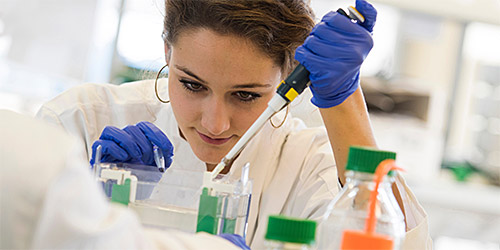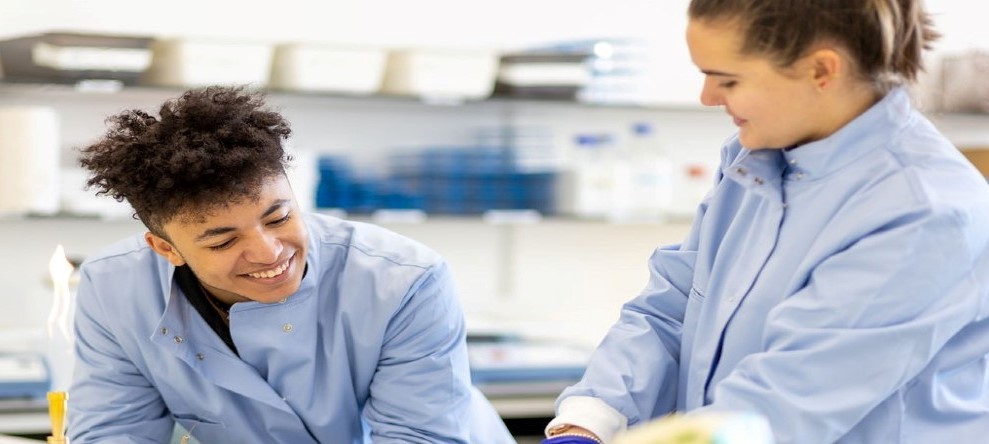Intercalating at Cellular and Molecular Medicine
The School welcomes all intercalating medical, dental and vet students on to our courses in Cellular and Molecular Medicine, accepting applications from the UK and internationally.
As an intercalating student you will join our current third-year undergraduates learning what it is like to be involved in biomedical research and how to think like a scientist. You will develop critical and analytical skills which will benefit you enormously in your future career as a doctor, dentist or vet.
At the School of Cellular and Molecular Medicine we aim to inspire students with our mission to ‘turn science into medicine’. We are training the next generation of life scientists to understand the cellular and molecular basis of human disease and translate scientific discoveries into applications that could change the lives of individuals and communities. Students will join a community of world experts working on some of the biggest threats and opportunities in human health, from cancer, anti-microbial resistance and COVID-19 to regenerative medicine and bioengineering.
What will I study?
The course will consist of one of four programme areas to choose from (listed below), each with four taught units and a substantial research project.
Your research project
A highlight of the year for all programmes is your research project, during which you will conduct original research, working as part of a small group of students. In addition to the lab-based projects, we also offer data-based projects for students to gain experience in analysing the large bodies of biomedical data being generated by high-throughput methods or the option to do a 'grant proposal' project.
Our students have produced projects in areas such as: The role of stem cells in the pathology and treatment of osteomyelitis (lab-based); Tissue-engineered cartilage grafts for the treatment of osteoarthritis (lab-based); The role of stem cells in breast cancer progression (data-based).
The recently introduced module Clinical Pathology in Action is available in all of the programme options. Pathology is the study of disease connecting science and medicine. It contributes to every aspect of patient care, from initial diagnosis, to informing individual patient treatment choice and the broader impacts on population health. The unit will explore how Pathology uses traditional microscopic and macroscopic techniques, through to state of the art tests. It brings together multiple aspects of the discipline of clinical pathology, with examples from a variety of medical conditions which fall within the investigative remit of pathologists.
I loved intercalating at the School of Cellular and Molecular Medicine. The project was my favourite part of the year. I was assigned two supervisors, one of whom was a PhD student, which was really helpful.
Programme routes:
Cellular and Molecular Medicine (BSc)
You will choose four of the following ten taught units:
• Clinical Pathology in Action • Regenerative Medicine • Developmental Genetics and Embryonal Cancers • Cancer Mechanisms and Therapeutics • Advanced Immunology • Immunopathology and Applied Immunology • Medical Virology • Medical Microbiology • Frontiers in Infectious Diseases.
Some combinations of units will lead to the award of one of our other degree courses (detailed below): Cancer Biology and Immunology, Medical Microbiology, or Virology and Immunology. Students can transfer freely between any of these degree programmes.
Cancer Biology and Immunology (BSc)
You will choose at least three of the four lecture unit:
• Developmental Genetics and Embryonal Cancers outlines how critical molecules, pathways and mechanisms regulate cell growth and development. You will learn how defects and diversions in normal growth control can lead to developmental diseases and cancer.
• Cancer Mechanisms and Therapeutics shows how cancers develop and which key genes and growth signalling pathways become defective, leading to the development of common adult cancers. You will discover how a knowledge of defective signalling pathways can reveal novel measures to prevent, detect and treat cancer.
• Advanced Immunology is at the cutting edge of research; this in-depth unit explores the cellular and molecular events that drive immune responses. It illustrates the development and differentiation of immune cells, how the immune system processes and recognises antigens, how immune cells home to the tissues of our body where they are needed, and the consequences of their communications. It demonstrates that the immune system needs control and shows how this is achieved to avoid disease.
• Immunopathology and Applied Immunology provides you with a comprehensive knowledge of diseases that develop because of inappropriate immune responses or deficiencies in the immune system. It also introduces you to disease processes and shows how this knowledge is used to manipulate the immune system through vaccination and other immunotherapies to fight infection, allergy, autoimmunity and tumour development.
You can opt to take an alternative fourth unit from the following: • Clinical Pathology in Action • Regenerative Medicine • Medical Virology • Frontiers in Infectious Diseases • Medical Microbiology.
Medical Microbiology (BSc)
You will take the following three compulsory lecture units, with a fourth optional unit:
• Medical Microbiology describes how bacteria and fungi become resistant to antimicrobial agents and investigates the genetic mechanisms involved in the spread of resistance. It covers the clinical problems caused by key drug-resistant bacteria in healthcare settings, and how changes in healthcare have exacerbated this problem. You will also study methods for tracking and controlling healthcare-associated infections and approaches to combatting drug resistance.
• Medical Virology discusses how viruses are responsible for millions of deaths and countless episodes of ill health each year around the world. Effective vaccines exist to combat some viral infections, but in many cases good vaccines remain elusive. This unit examines these challenges, looking at the main viral diseases in humans such as Covid-19, HIV, hepatitis B and C, herpes, papilloma, influenza, measles and rotaviruses. It also reviews the increasingly sophisticated area of diagnostic virology.
• Frontiers in Infectious Diseases reveals the key steps in pathogen life cycles and how these are dealt with at a molecular level by defence mechanisms in the host. It shows how this knowledge allows us to devise both prophylactic and therapeutic interventions and will help you develop an understanding of the key research methods that are currently used to study viral and bacterial pathogens within mammalian hosts.
Choose the fourth unit from the following options: • Clinical Pathology in Action • Developmental Genetics and Embryonal Cancers • Cancer Mechanisms and Therapeutics • Advanced Immunology • Immunopathology and Applied Immunology • Regenerative Medicine.
Virology and Immunology (BSc)
You will take the following three compulsory lecture units, with a fourth optional unit:
• Medical Virology reviews the general virology of the most important viral pathogens in terms of world health, including Covid-19, HIV, hepatitis, herpes, influenza and measles. You will study each virus in terms of its natural history, biology, molecular biology, immunology, pathogenesis and epidemiology.
• Frontiers in Infectious Disease reveals the key steps in pathogen life cycles and how these are dealt with at a molecular level by defence mechanisms in the host. You will use this knowledge to devise both prophylactic and therapeutic interventions by developing an understanding of the key research methods that are currently used to study viral and bacterial pathogens within mammalian hosts.
• Immunopathology and Applied Immunology provides you with a comprehensive knowledge of diseases which develop as a consequence of inappropriate immune responses, and as a result of deficiencies in the immune system. It also introduces you to disease processes and demonstrates how this knowledge is used to manipulate the immune system through vaccination and other immunotherapies to fight infection, allergy, autoimmunity and tumour development.
Choose the fourth unit from the following options: • Clinical Pathology in Action • Medical Microbiology • Developmental Genetics and Embryonal Cancers • Cancer Mechanisms and Therapeutics • Advanced Immunology • Regenerative Medicine.
 How to apply
How to apply
Find out more about how to intercalate at Bristol with details about applying, fees and funding.
Learn more about CMM
Learn more about studying at the School of Cellular and Molecular Medicine.
Intercalation will help me when I go back to dentistry because I have learnt so much from it, in terms of managing my time and learning how to find information other than what has been given to me. I’m working with a supervisor who has managed to find a dental focus for my research project.
Student life at Bristol
Students fall in love with Bristol - a city small enough to remain friendly, but large enough to offer lots of interest and excitement. With our central location, outstanding facilities and active Students' Union, you can enjoy the best of student life
Contact us
Contact us at Cellular and Molecular Medicine if you have any questions about intercalating.
